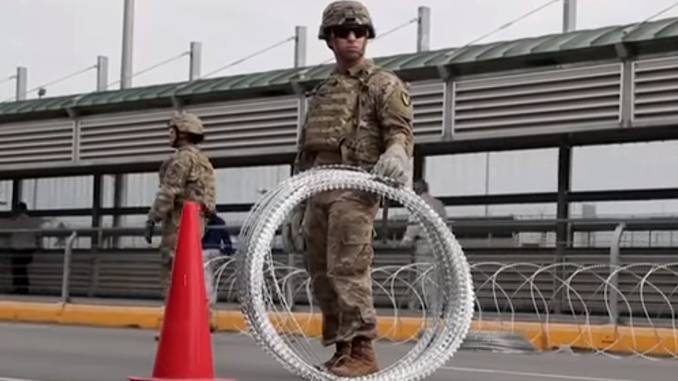
If there is one defining promise of President Trump to his base, it is this: The Wall. A vast, impenetrable barrier to be erected between the United States and Mexico, it is to be paid for by the latter and, whenever challenged, mystically grows anywhere from twenty to a hundred feet higher.
His critics and naysayers have repeatedly decried The Wall. It would not be impenetrable, they say; Mexico will not pay for it; it will not be built. Meanwhile, Trump has repaired and replaced segments of existing wall, has had designs drawn, has had land claimed for its construction, has diverted money for its construction from other projects and has changed existing laws to reduce the viability of lawsuits against it.
Even if he has no expectation of constructing the wall, he’s playing to his crowd and acting as if he might. This excites them.
They conjure mental images of the Berlin Wall, of the Great Wall of China, perhaps even of Hadrian’s Wall (although perhaps, as people point out that the majority of illegal immigrants enter by means other than sneaking across the Southern border, they might be better off imagining the Maginot Line). One way or another, they adore the wall.
The like it for one reason, the reason they have been told repeatedly by pundits: if a hard line is taken on border enforcement, the next administration can merely reverse that hard line. If a wall is constructed, the succeeding President can’t simply reverse the decision.
This is idiocy.
The fatal flaw of “The Wall” theory is that it has always needed broad public support… something the populists have decided, with Trump, to forego. President Trump has never achieved a 50% approval on his Mexico policy; to the contrary, his draconian and arguably racist attacks have often dragged his overall popularity lower, despite what was seen as a strong economy, the defeat (however temporary) of ISIS and negotiations of peace toward our enemies (even if that is peace through capitulation.)
The Wall, simply put, is unpopular, and Trump has done nothing to make it so.
In such an atmosphere, let us posit the unlikely: The President manages to construct the wall using diverted funds. In such an instance, his supporters will cheer and rally. It would not matter that it is incomplete; rather, for the sake of this analysis, let us imagine that it is, and that at the cost of a few billion he has managed to construct one that rises five hundred feet into the air with machine-gun turrets and motion sensors along every yard and traverses every foot of land between California and the Gulf of Mexico.
What then?
It will be a political device, obviously; Republicans will rally for it. Democrats will rally against it. Independents will shift toward one of those two parties or will be galvanized toward a third party or may simply stay home. In other words, the turnout will be higher.
The attitude about the wall, however, will not change.
In such an instance, the next time the President is a non-Republican… which, by current polling that shows Trump losing battleground states to all Democrats with name recognition is very likely to be 2020… and there is a Democrat Congress (again, likely in 2020) among the first actions by the new administration will be a photo opportunity on the Southern border, where they stand smiling beside the wrecking ball that is about to destroy the first section of wall.
The Berlin Wall is imagined as the massive barrier that split the greatest German city in two, but the Berlin Wall came down once the Soviet government stopped supporting it, and it came down quickly.
This is part and parcel of the American experience: a President and a Congress must pay attention to the desires of the people. The art of politics (a book which Trump may one day have ghost-written, about which he knows nothing) is not found in getting things done while in control, but in convincing a majority of the people that those things are desirable.
Trump’s wall is not. All the money, time and words wasted on it are ineffective because of that. Ironically, the best chance the Trump supporters have of keeping even the existing walls is if Trump fails to construct much in the way of new barriers. Every new foot becomes a greater lure for that photo opportunity for the next President; the more the new construction, the faster it will be torn away, and the increased likelihood that existing, successful fencing will be torn down as well.
All of this is theoretical, because it’s by no means certain that so much of a foot of new wall will be constructed by the time of the election. In all likelihood, the constant efforts toward creating the wall and attacking immigrants will be a key reason for Trump’s defeat in 2020.
In the end, I believe we’re looking at one actual construction associated with the Southern border. A new term, the counterpoint to Pyrrhic victory: Republican failure, where all of the work towards a new success leads to the loss of a previously established victory. Perhaps it can be added to dictionaries in an orange font.
